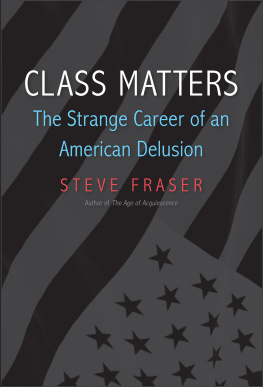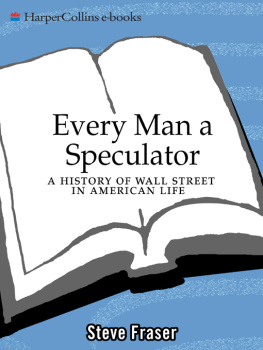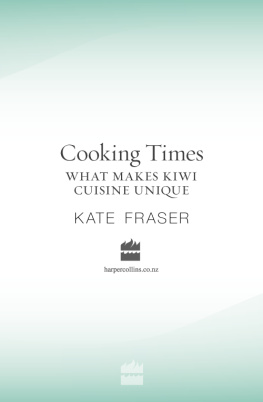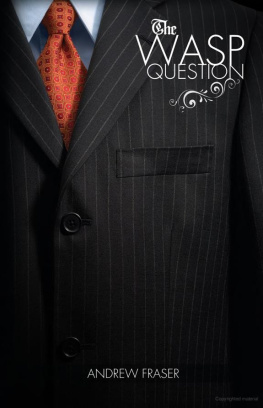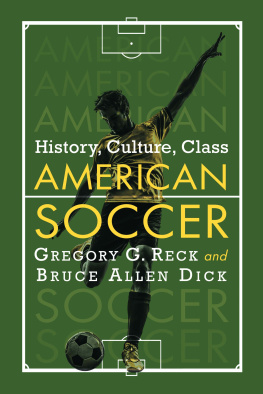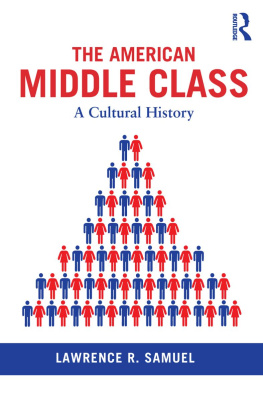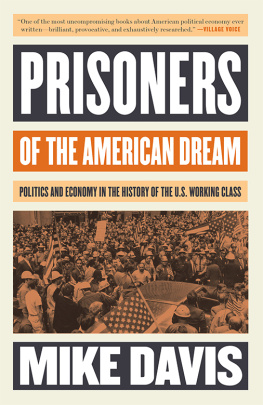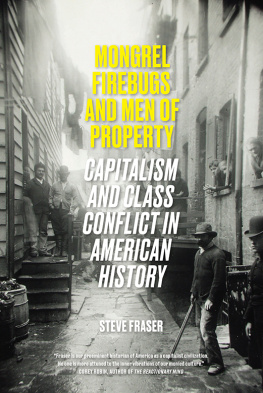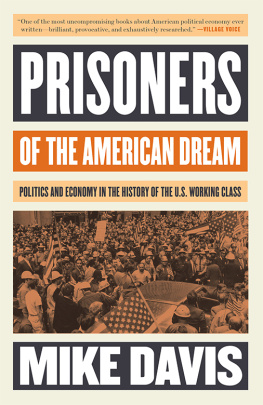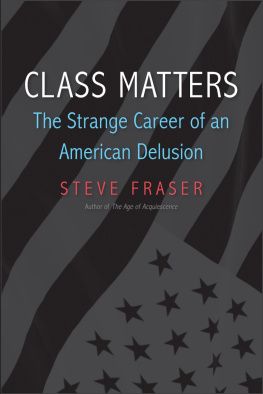Class Matters

Published with assistance from the Louis Stern Memorial Fund.
Copyright 2018 by Steve Fraser.
All rights reserved.
This book may not be reproduced, in whole or in part, including illustrations, in any form (beyond that copying permitted by Sections 107 and 108 of the U.S. Copyright Law and except by reviewers for the public press), without written permission from the publishers.
Yale University Press books may be purchased in quantity for educational, business, or promotional use. For information, please e-mail (U.K. office).
Set in Minion type by IDS Infotech, Ltd.
Printed in the United States of America.
Library of Congress Control Number: 2017948003
ISBN 978-0-300-22150-3 (hardcover : alk. paper)
A catalogue record for this book is available from the British Library.
This paper meets the requirements of ANSI/NISO Z39.481992 (Permanence of Paper).
10 9 8 7 6 5 4 3 2 1
For RichardLong may he ride through his hearts pastureland
For Sabina, someday
In memory of Vev
Contents
Acknowledgments
In one way or another much of what Ive written about over the years has involved the role of class in American history. I might have come up with the idea of writing about why class matters on my own. But I didnt. Steve Wasserman, then an editor at Yale University Press, suggested I tackle this subject. I had known Steve through his various incarnations as a discerning editor and literary agent. When he broached this, I knew I wanted to give it a try. But I wasnt sure how to approach the project. I threw out a slew of ideas about how I might go about it and Steve was my first sounding board. So I am grateful to him both for the genesis of this book and for helping me through this period of what I hope turned out be productive confusion.
Others were equally helpful in listening, criticizing, and offering their own ideas about how to grapple with a topic that offered up almost too many tempting ways in. My long-time friends Josh Freeman and Paul Milkman were among those early listeners and commentators. I have relied on their judgment for every book Ive written. That is true as well of my wife Jill. I also called on the three of them again to read and criticize initial fragments and whole drafts of some of the first chapters as well as for other advice and help once the book was complete. My good friend Rochelle Gurstein also read some early material and as always provided sharp, sympathetic criticism. When I had about half the book drafted I grew nervous about the approach I had adopted. I asked another friend Marshall Rafal, and two superb historians, Elaine May and Nelson Lichtenstein, to react to what I had done. They did so with alacrity, and combined critical commentary with encouragement that the approach I had chosen seemed to be working.
When I had a complete draft in hand, Yale University Press asked the distinguished historian Gary Gerstle to provide the Press with a critical reading. He produced a wonderfully inciteful and sympathetic critique and then subsequently shared with me the knowledge that he was its author. Gary is not only a talented writer and historian, but an editor as well; indeed, he and I have edited two books of essays together. Class Matters benefited immensely from all these readings, but especially from Garys.
Many people I dont know or barely knowscholars and laymen alikemade indispensable contributions to this book. Class Matters covers six subjects about none of which can I pretend to have expert knowledge. Without the work of historians, social scientists, and journalists whose work is cited in the endnotes there is no way I could have written this book.
Other good friends helped along the way in discussing possible titles, jacket designs, and other matters dear to an author who is also a once, and now and then still an editor. Thanks to Robert Boyers, Tom Engelhardt, Corey Robin, and Geoff Shandler as well as a good number of the people Ive already thanked above.
I am in debt of course to several people at Yale University Press. When Steve Wasserman left Yale for another publishing position, Yales Editorial Director Seth Ditchik graciously took over the project. I have valued his advice and warm support for my orphaned book. His assistant Michael Deneen has been unfailingly responsive to every noodling question and anxiety that impatient and anxious authors often are apt to express. Robin DuBlanc is a superb copyeditor and also knows how to hold the hand of a self-doubting writer. Margaret Otzel epitomized professionalism in her work as the books production editor and, like Robin, made that production process seem less impersonal than it sometimes can. I want to thank as well my publicist Brenda King. And finally at Yale I want to thank Mary Valencia for her perceptive visualization of the books mood and purpose in her design of the books dust jacket.
As always, my family has been my most precious asset. They helped in specific ways, but most of all by being there for me. Without Jill there would be no books nor much of what I value. My son Max and his wife Elena are dear to me, not least for bringing into the world my brand-new granddaughter Sabina who is hilarious and a thrill. I cant imagine my life without my daughter Emma. My brother Jon and his husband Marco have enriched my life and the familys in so many ways. And to that group I must add my last remaining uncle, Arthur Oluwek who shared with me information and memories of his father, my grandfather, that find their way into Chapter 3. To all of them thanks is scarcely enough.
Introduction
The Enigma of Class in America
I am sitting down to write this two days prior to the inauguration of Donald Trump as the forty-fifth president of the United States. So I am tempted to compose the shortest book on record: The answer to Why Class Matters is Duh. And thank you for your time and you can thank me for mine.
Debates over how the inconceivable happened will stay hot for years to come. But the triumph of the Donald, everyone seems to agree, had something vital to do with the surfacing of a rebellious working class, in particular a white working class. Suddenly class seemed to matter a great deal in a country long grown accustomed to relegating matters of class to some musty attic of national memory.
Trump doesnt deserve all the credit, however. In the run-up to his stupendously unanticipated victory, the notion of class had been worming its way to the surface of public life. Across the Western world, from London to Athens, the norms of public life were being shattered by right- and left-wing populisms fired by class animosities. Here at home, people had become acutely sensitive to the specter of the class divisions in our midst, faintly reminiscent of that specter Karl Marx invoked when he
Everyday life in every way bears the stigmata of class. Who lives longest and who dies soonest, who goes to jail and who is free, who is healthy and who sickly, who learns and who lives in ignorance, who gets bailed out and who goes under, who pursues happiness and who goes off to fight and die, who lives with rooms to spare and who six to a room, who breathes clean air and drinks clean water and who is poisoned, whose children thrive and whose barely survive, who looks to the future and who lives moment to moment, who is secure and who in peril, who rules and who obeys? Answers to these and other life-and-death questions depend to a very considerable degree on just which niche in the class hierarchy you inhabit. Reports and research studies periodically remind us of these stark realities.
Next page
